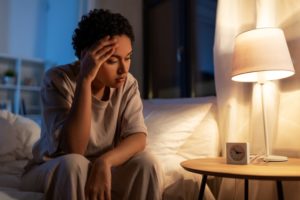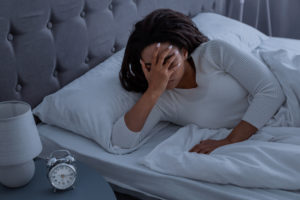Can a Lack of Sleep Cause Headaches?
A good night’s rest is essential for well-being. Sleep regulates and restores many of the body’s functions, like learning, memory, and immunity. Sleep also influences mood, as well as organs like the brain, heart, and lungs. Since good-quality sleep is so crucial, a lack of sleep can negatively impact these systems and lead to mental and physical health problems, including various headache disorders like migraines.
Can Sleep Deprivation Cause Headaches and Migraines?
Research has established a solid relationship between sleeping problems and migraines, tension-type headaches, cluster headaches, and hypnic headaches. Migraines commonly occur upon waking up in the morning, and those who experience migraines in particular are more likely to suffer from insufficient sleep than those with other headache disorders. In addition to increasing the risk for migraines, sleep deprivation has also been shown to increase the severity and frequency of migraines .
Sleep deprivation occurs when one does not have the opportunity to get enough sleep. Sleep deprivation has been linked to reduced cognitive performance and focus, excessive daytime sleepiness, mood changes, and trouble with memory and decision-making.
How Are Migraines Different from Headaches?
Migraines occur in about 12% of the U.S. population . They are recurrent headaches characterized by moderate to severe throbbing or pulsing pain, which is often concentrated on one side of the head. Other common symptoms include nausea, weakness, and sensitivity to light and sound.
Migraines are further categorized by the presence of aura. This refers to additional symptoms that may occur before or during a migraine, including muscle weakness, tingling, visual disturbances or distortions, loss of vision, and other neurological symptoms. Women are three times more likely than men to suffer from migraines, and those with a family history of migraines are more likely to experience migraines themselves.
How Does Sleep Deprivation Trigger Migraines?
Additional research is needed to fully understand the relationship between sleep deprivation and migraines, however, they do share common brain mechanisms . The hypothalamus — the part of the brain that regulates sleep and arousal — contains neurons responsible for modulating pain. The hypothalamus also contains the suprachiasmatic nucleus (SCN), which receives signals from the eyes and helps match sleeping behaviors to the cycle of outdoor light and darkness. A damaged SCN may cause dysregulated daytime sleep and disrupt the sleep-wake cycle.
The pineal gland is another key part of the brain involved in sleep. The pineal gland produces melatonin, the hormone that helps people fall asleep when they recognize the change between day and night. Low levels of melatonin have been linked to migraines and cluster headaches, and may increase the chance of waking up with headaches.
Can Other Sleep Problems Trigger Migraines?
Research has found that not only too little sleep, but also too much sleep can trigger migraines. While restful sleep can relieve migraine symptoms while they are ongoing, sleeping extensively may make problems worse. The term “weekend migraine” is often used to refer to migraines that commonly occur in individuals sleeping in on weekends to make up for lost sleep during the week.
The relationship between sleep deprivation and migraines is also bidirectional. This means that sleep disturbances can trigger migraines, but migraines can also negatively impact sleep. Migraines can lead to exhaustion and excess sleepiness, which may disrupt the sleep-wake cycle.

What Can I Do If I Wake Up With a Migraine?
Although there is no cure for migraines, there are steps you can take to alleviate your symptoms . Over-the-counter pain relievers, a glass of water, or a cool, damp cloth on your forehead may bring relief. You can also make sure your surroundings are quiet, dark, and peaceful. If your migraines are persistent or severe, it can be beneficial to speak with your physician. A health care provider can work with you to understand your symptoms, discuss your medical history, and perform physical or neurological exams to rule out other conditions that may be causing migraines. They may also prescribe medications to help with your migraines.
How Can I Prevent Future Headaches and Migraines?
The relationship between sleep and migraines is complex. Since both too little and too much sleep have been associated with migraines and other headache disorders, one of the most important ways to combat these problems is to get the right amount of sleep. Medical experts recommend that adults sleep at least seven hours per night for optimum health, while younger people may need more sleep. It is also essential to practice good sleep hygiene to get the most restful sleep possible. These habits can help you develop and maintain a healthy sleep routine.
- Stick to a schedule: Try to go to bed and wake up at the same times every day, even on weekends. Keeping your sleep schedule consistent helps avoid insufficient or excessive sleep that can trigger migraines.
- Avoid substances before bed: Alcohol, nicotine, and caffeine can interfere with your sleep quality and consistency.
- Get comfortable: Take time to relax before bed by engaging in calming activities like reading, meditating, or listening to music. Make sure your room is kept at a cool and comfortable temperature, and your mattress offers plenty of support.
- Turn off the lights: In addition to your lamps and overhead lights, the light emitted from mobile phones, tablets, TVs, and other electronic devices can disrupt your circadian rhythm and make falling asleep difficult. It is best to shut off these devices before bedtime and avoid using them while in bed.

Still have questions? Ask our community!
Join our Sleep Care Community — a trusted hub of sleep health professionals, product specialists, and people just like you. Whether you need expert sleep advice for your insomnia or you’re searching for the perfect mattress, we’ve got you covered. Get personalized guidance from the experts who know sleep best.
References
9 Sources
-
Kim, J., Cho, S. J., Kim, W. J., Yang, K. I., Yun, C. H., & Chu, M. K. (2017). Insufficient sleep is prevalent among migraineurs: a population-based study. The Journal of Headache and Pain, 18(1), 50.
https://pubmed.ncbi.nlm.nih.gov/28455722/ -
Houle, T. T., Butschek, R. A., Turner, D. P., Smitherman, T. A., Rains, J. C., & Penzien, D. B. (2012). Stress and sleep duration predict headache severity in chronic headache sufferers. Pain, 153(12), 2432–2440.
https://pubmed.ncbi.nlm.nih.gov/15070571/ -
Silberstein, S.D. (2004). Migraine. Lancet (London, England), 363(9406), 381–391.
https://pubmed.ncbi.nlm.nih.gov/15070571/ -
Lin, Y. K., Lin, G. Y., Lee, J. T., Lee, M. S., Tsai, C. K., Hsu, Y. W., Lin, Y. Z., Tsai, Y. C., & Yang, F. C. (2016). Associations Between Sleep Quality and Migraine Frequency: A Cross-Sectional Case-Control Study. Medicine, 95(17), e3554.
https://pubmed.ncbi.nlm.nih.gov/27124064/ -
Masruha, M. R, Lin, J., de Souza, Vieira D. S., Minett, T. S., Cipolla-Neto, J., Zukerman, E., Vilanova, L. C, Peres, M. F. (2010). Urinary 6-sulphatoxymelatonin levels are depressed in chronic migraine and several comorbidities. Headache, 50(3), 413–419.
https://pubmed.ncbi.nlm.nih.gov/19817880/ -
Jennum, P., & Jensen, R. (2002). Sleep and headache. Sleep Medicine Reviews, 6(6), 471–479.
https://pubmed.ncbi.nlm.nih.gov/12505479/ -
Fernández-de-Las-Peñas, C., Fernández-Muñoz, J. J., Palacios-Ceña, M., Parás-Bravo, P., Cigarán-Méndez, M., & Navarro-Pardo, E. (2017). Sleep disturbances in tension-type headache and migraine. Therapeutic advances in neurological disorders.
https://pubmed.ncbi.nlm.nih.gov/29399051/ -
MedlinePlus: National Library of Medicine (US). (2019, January 1). Migraine.
https://medlineplus.gov/genetics/condition/migraine/ -
Consensus Conference Panel, Watson, N. F., Badr, M. S., Belenky, G., Bliwise, D. L., Buxton, O. M., Buysse, D., Dinges, D. F., Gangwisch, J., Grandner, M. A., Kushida, C., Malhotra, R. K., Martin, J. L., Patel, S. R., Quan, S. F., Tasali, E., Non-Participating Observers, Twery, M., Croft, J. B., Maher, E., … Heald, J. L. (2015). Recommended amount of sleep for a healthy adult: A joint consensus statement of the American Academy of Sleep Medicine and Sleep Research Society. Journal of Clinical Sleep Medicine, 11(6), 591–592.
https://pubmed.ncbi.nlm.nih.gov/25979105/











